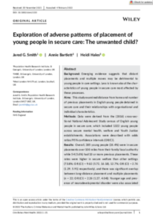Background:
Emerging evidence suggests that distant placements and multiple moves may be detrimental to young people in care settings. Less is known about the characteristics of young people in secure care most affected by these processes.
Aims:
This study examined distance from home and number of previous placements in English young people detained in secure care and their relationships with organisational and individual characteristics.
Methods:
Data were derived from the (2016) cross-sectional National Adolescent Study census of English young people in secure care, which included 1322 young people across secure mental health, welfare and Youth Justice establishments. Associations were described with odds ratios/95% confidence intervals (OR/CI).
Results:
Overall, 285 young people (26.4%) were in secure placements over 100 miles from their family/local authority while 54 (5.6%) had 10 or more previous placements. These rates were higher in secure welfare than other settings (73.8%; OR (CI) = 9.62 (5.72, 16.18), 12.7%; OR (CI) = 2.76 (1.29, 5.91) respectively), and there was significant overlap between long-distance placement and multiple placements (n = 22; OR (CI) = 2.26 (1.27, 4.04)). Younger age and presence of neurodevelopmental disorder were also associated

